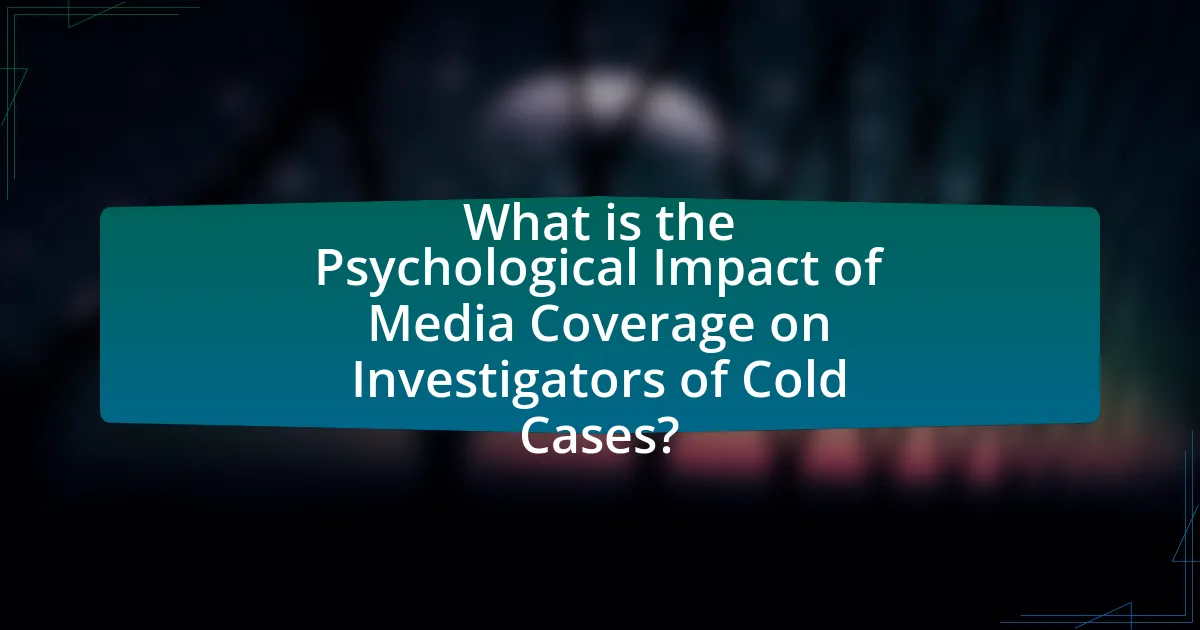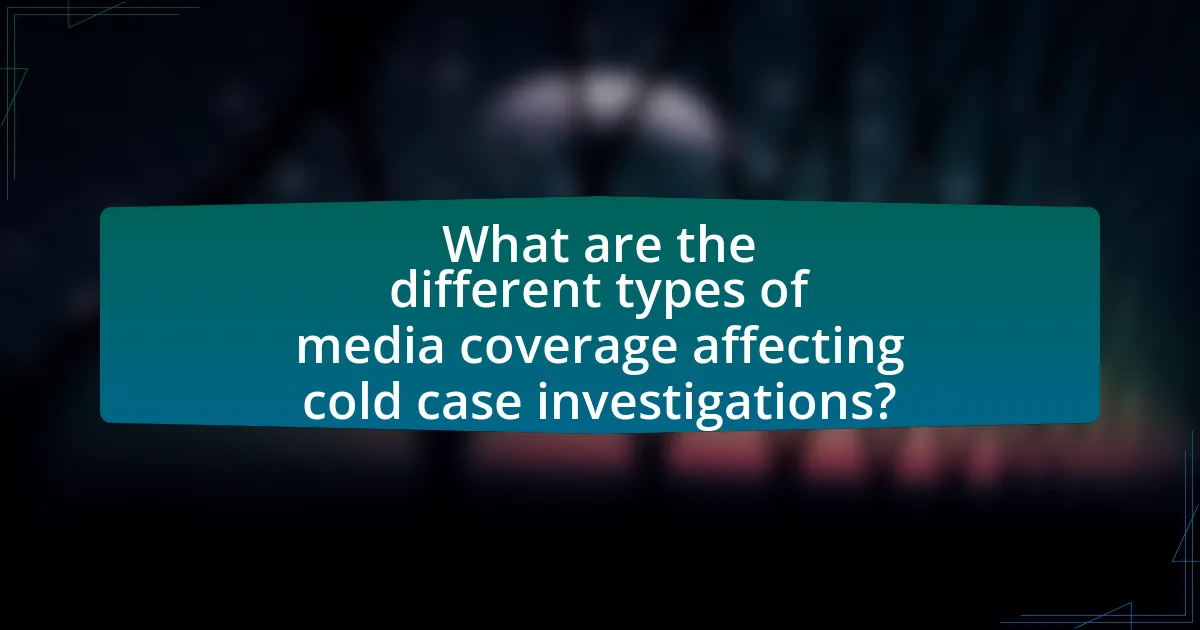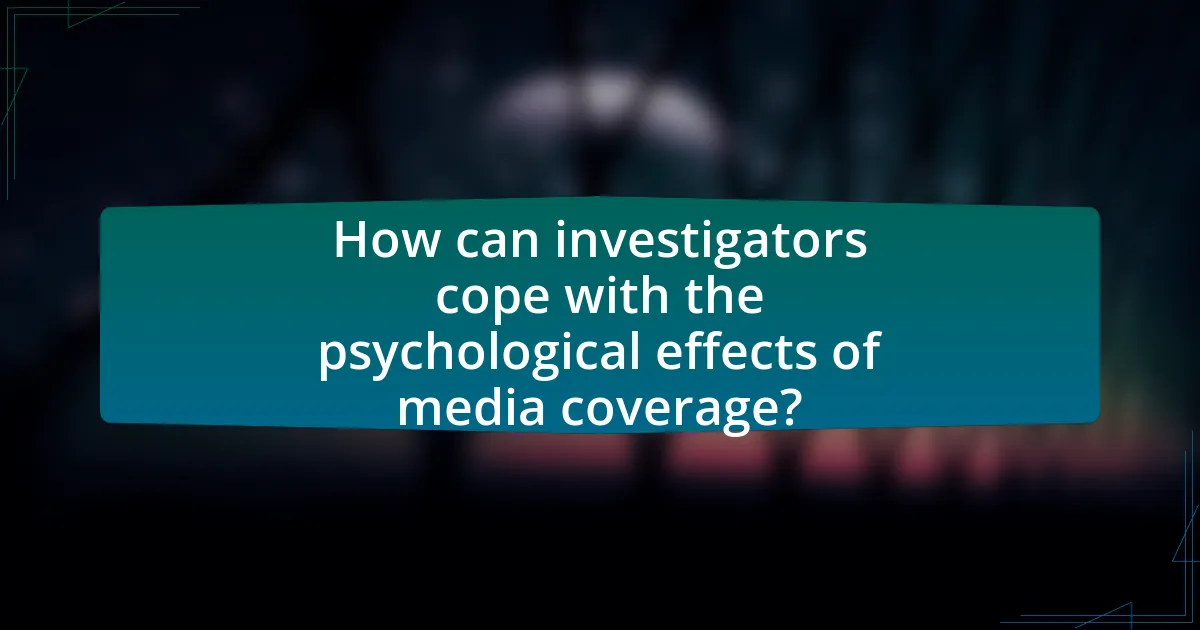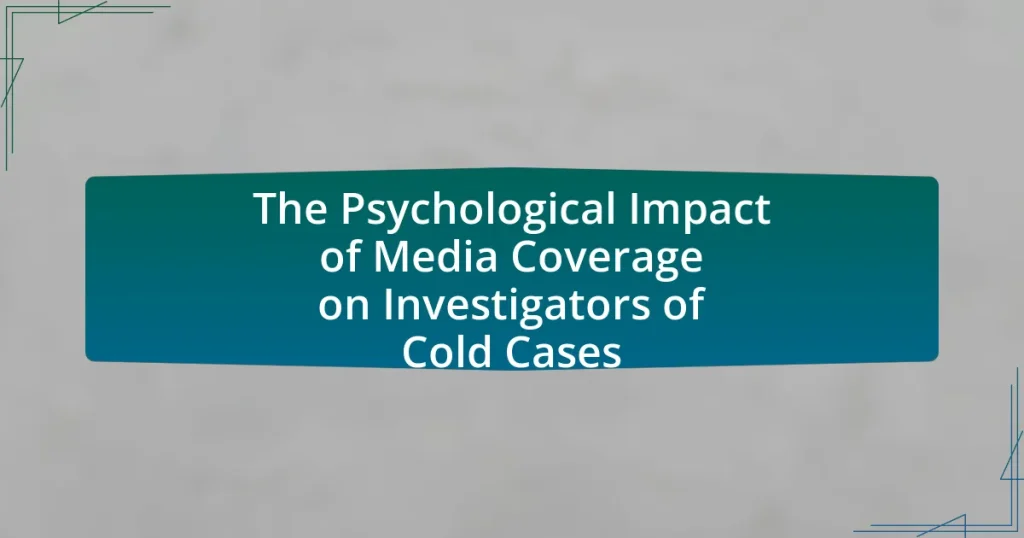The article examines the psychological impact of media coverage on investigators of cold cases, highlighting how increased public scrutiny can lead to heightened stress, anxiety, and burnout among law enforcement personnel. It discusses the varying effects of media attention on different investigators, emphasizing the importance of understanding these psychological challenges for law enforcement agencies. The article also explores strategies for supporting investigator well-being, including mental health resources, communication protocols, and training programs designed to manage media interactions effectively. Additionally, it addresses the dual nature of media coverage, outlining both its potential benefits in generating leads and the negative consequences of excessive scrutiny.

What is the Psychological Impact of Media Coverage on Investigators of Cold Cases?
Media coverage of cold cases significantly impacts investigators psychologically by increasing stress and pressure to solve cases. Investigators often feel heightened scrutiny from the public and media, which can lead to anxiety and burnout. A study published in the Journal of Criminal Justice found that the constant media attention can create a sense of urgency that may not align with the realities of investigative work, resulting in emotional strain. Additionally, the portrayal of cases in the media can lead to unrealistic expectations, further exacerbating the psychological burden on investigators.
How does media coverage influence the mental health of cold case investigators?
Media coverage significantly influences the mental health of cold case investigators by increasing stress and emotional burden. Investigators often face public scrutiny and pressure to solve cases that receive extensive media attention, which can lead to feelings of inadequacy and frustration when progress is slow. Research indicates that high-profile cases can exacerbate anxiety and depression among law enforcement personnel, as they may feel responsible for meeting public expectations. For instance, a study published in the Journal of Criminal Justice found that officers involved in media-heavy cases reported higher levels of job-related stress and burnout compared to those working on less publicized investigations. This correlation highlights the detrimental effects of media exposure on the psychological well-being of cold case investigators.
What specific psychological effects are observed in investigators due to media scrutiny?
Investigators experience heightened stress, anxiety, and pressure due to media scrutiny. This external pressure can lead to feelings of being constantly evaluated, resulting in increased job-related stress and potential burnout. Research indicates that the public nature of media coverage can exacerbate feelings of isolation among investigators, as they may feel unsupported in their efforts. Additionally, the fear of public criticism can lead to second-guessing their decisions and strategies, which may hinder their investigative effectiveness. Studies have shown that prolonged exposure to media scrutiny can contribute to mental health issues, including depression and anxiety disorders, as investigators grapple with the dual demands of their work and public perception.
How do these effects vary among different investigators?
The effects of media coverage on investigators of cold cases vary significantly among different investigators due to individual psychological resilience, personal experiences, and professional backgrounds. For instance, some investigators may experience heightened stress and anxiety from public scrutiny, while others may find motivation and support from media attention, leading to increased determination to solve cases. Research indicates that investigators with prior exposure to media scrutiny may develop coping mechanisms that mitigate negative psychological impacts, whereas those without such experience may struggle more intensely with the pressures of public expectation. This variability underscores the importance of understanding individual differences in psychological responses to media coverage in the context of cold case investigations.
Why is understanding this impact important for law enforcement agencies?
Understanding the psychological impact of media coverage on investigators of cold cases is crucial for law enforcement agencies because it directly affects the mental well-being and effectiveness of their personnel. Investigators exposed to intense media scrutiny may experience increased stress, anxiety, and burnout, which can impair their decision-making and investigative capabilities. Research indicates that high levels of stress can lead to decreased job performance and higher turnover rates within law enforcement, ultimately hindering the resolution of cold cases. By recognizing and addressing these psychological impacts, agencies can implement support systems and training that enhance investigator resilience and improve case outcomes.
What role does investigator well-being play in solving cold cases?
Investigator well-being significantly influences the effectiveness of solving cold cases. When investigators maintain good mental and emotional health, they are more likely to exhibit enhanced focus, creativity, and resilience, which are crucial for analyzing complex evidence and developing new leads. Research indicates that high levels of stress and burnout can impair decision-making and problem-solving abilities, ultimately hindering the investigative process. For instance, a study published in the Journal of Criminal Justice found that investigators experiencing lower levels of psychological distress were more successful in generating actionable insights from cold case files. Thus, prioritizing investigator well-being can lead to improved outcomes in resolving cold cases.
How can agencies support investigators facing media pressure?
Agencies can support investigators facing media pressure by providing clear communication strategies and mental health resources. Effective communication strategies help investigators manage media inquiries and set boundaries, ensuring that they can focus on their work without unnecessary distractions. Additionally, offering access to mental health resources, such as counseling and stress management programs, can mitigate the psychological impact of media scrutiny, which has been shown to contribute to increased stress and burnout among law enforcement personnel. Studies indicate that investigators exposed to high levels of media attention experience heightened anxiety, making these support mechanisms crucial for maintaining their well-being and effectiveness in solving cold cases.

What are the different types of media coverage affecting cold case investigations?
Different types of media coverage affecting cold case investigations include investigative journalism, sensationalized reporting, social media engagement, and documentary features. Investigative journalism often brings renewed attention to cold cases, potentially leading to new tips or witnesses coming forward, as seen in cases like the Golden State Killer, where media coverage played a crucial role in solving the case. Sensationalized reporting can create public pressure on law enforcement, sometimes leading to rushed conclusions or misdirection in investigations. Social media engagement allows for community involvement and sharing of information, which can either aid investigations or spread misinformation. Documentary features can provide in-depth analysis and raise awareness, as demonstrated by the popularity of true crime series that have led to renewed interest in unsolved cases. Each type of media coverage has a distinct impact on the investigative process, influencing both public perception and the actions of law enforcement.
How do traditional media and social media differ in their impact?
Traditional media and social media differ significantly in their impact on audiences and information dissemination. Traditional media, such as newspapers and television, typically provide curated, fact-checked content that adheres to journalistic standards, resulting in a slower but more reliable information flow. In contrast, social media platforms enable rapid sharing and user-generated content, which can lead to the spread of misinformation and a more fragmented narrative. For example, a study by the Pew Research Center found that 62% of Americans get news from social media, highlighting its pervasive influence, yet this medium often lacks the editorial oversight present in traditional outlets. This difference in impact shapes how audiences perceive and engage with information, particularly in sensitive contexts like cold case investigations, where accuracy and reliability are crucial.
What are the unique challenges posed by social media coverage?
Social media coverage presents unique challenges such as the rapid spread of misinformation, which can distort public perception and hinder investigations. For instance, false narratives can emerge quickly, leading to public pressure on investigators and potentially compromising the integrity of ongoing cases. Additionally, the immediacy of social media can result in investigators facing scrutiny and criticism in real-time, impacting their mental well-being and decision-making processes. Research indicates that the constant exposure to public opinion can exacerbate stress and anxiety among law enforcement professionals, making it difficult for them to focus on their investigative duties effectively.
How does sensationalism in traditional media affect public perception of cold cases?
Sensationalism in traditional media significantly skews public perception of cold cases by amplifying emotional responses and creating misconceptions. This type of media coverage often emphasizes dramatic elements, such as gruesome details or sensational narratives, which can lead the public to view cold cases as more mysterious or unsolvable than they may actually be. Research indicates that sensationalized reporting can result in increased public interest and engagement, but it also fosters unrealistic expectations regarding the resolution of these cases. For instance, a study published in the Journal of Criminal Justice found that sensationalized media portrayals can lead to a misinformed public that believes cold cases are more prevalent than they are, ultimately affecting the support for law enforcement efforts and the resources allocated to solving these cases.
What are the potential positive and negative effects of media coverage?
Media coverage can have both positive and negative effects on investigators of cold cases. On the positive side, media attention can generate public interest and lead to new tips or information, as seen in cases like the 2018 re-investigation of the Golden State Killer, where renewed media focus resulted in crucial DNA evidence being uncovered. Conversely, negative effects include increased pressure and scrutiny on investigators, which can lead to stress and burnout, as highlighted in a study by the National Institute of Justice that found high levels of stress among law enforcement officials involved in high-profile cases.
How can positive media attention aid in solving cold cases?
Positive media attention can significantly aid in solving cold cases by increasing public awareness and encouraging potential witnesses to come forward. When media outlets highlight a cold case positively, they can reignite interest in the investigation, prompting individuals who may have previously withheld information to share what they know. For instance, a study by the National Institute of Justice found that media coverage can lead to a 30% increase in tips received by law enforcement agencies. This influx of information can provide new leads, ultimately assisting investigators in resolving cases that have remained unsolved for years.
What negative consequences can arise from excessive media focus?
Excessive media focus can lead to significant psychological stress for investigators of cold cases. This stress often manifests as anxiety, burnout, and feelings of inadequacy, as investigators may feel pressured to solve cases quickly due to public scrutiny. Research indicates that constant media attention can distort the perception of a case’s complexity, leading to unrealistic expectations from both the public and law enforcement agencies. A study published in the Journal of Criminal Justice found that investigators exposed to high levels of media coverage reported increased emotional exhaustion and a decline in job satisfaction, highlighting the detrimental effects of media pressure on their mental health.

How can investigators cope with the psychological effects of media coverage?
Investigators can cope with the psychological effects of media coverage by implementing strategies such as establishing clear boundaries with the media, seeking professional psychological support, and engaging in peer support networks. Establishing boundaries helps investigators manage the flow of information and reduces the stress associated with public scrutiny. Professional psychological support, including counseling or therapy, provides a safe space for investigators to process their experiences and emotions, which is crucial given the high-stress nature of their work. Engaging in peer support networks allows investigators to share their experiences and coping strategies with colleagues who understand the unique pressures they face, fostering a sense of community and shared resilience. These approaches are supported by research indicating that social support and professional mental health resources significantly mitigate the adverse psychological effects of high-stress occupations, including law enforcement and investigative roles.
What strategies can investigators employ to manage stress related to media scrutiny?
Investigators can manage stress related to media scrutiny by implementing strategies such as establishing clear communication protocols, engaging in regular debriefing sessions, and utilizing stress management techniques like mindfulness and physical exercise. Clear communication protocols help investigators control the narrative and reduce misinformation, which can alleviate anxiety. Regular debriefing sessions provide a platform for investigators to express their feelings and share experiences, fostering a supportive environment. Mindfulness practices and physical exercise have been shown to reduce stress levels, as evidenced by studies indicating that such techniques can lower cortisol levels and improve overall mental health.
How effective are peer support systems in mitigating psychological impact?
Peer support systems are highly effective in mitigating psychological impact, particularly among individuals exposed to traumatic experiences, such as investigators of cold cases. Research indicates that these systems provide emotional support, reduce feelings of isolation, and enhance coping strategies. A study published in the Journal of Traumatic Stress found that peer support significantly decreased symptoms of post-traumatic stress disorder (PTSD) and improved overall mental health outcomes for participants. Furthermore, peer support fosters a sense of community and shared understanding, which is crucial for those dealing with the psychological toll of media scrutiny and unresolved cases.
What role does professional counseling play in supporting investigators?
Professional counseling plays a crucial role in supporting investigators by providing them with mental health resources to cope with the emotional and psychological stress associated with their work. Investigators often face high levels of anxiety, trauma, and burnout due to the nature of cold cases and the media scrutiny that accompanies them. Counseling offers a safe space for investigators to process their experiences, develop coping strategies, and enhance their emotional resilience. Research indicates that mental health support can significantly reduce symptoms of stress and improve overall job performance, thereby enabling investigators to maintain focus and effectiveness in their work.
What best practices can law enforcement agencies implement to protect their investigators?
Law enforcement agencies can implement several best practices to protect their investigators, particularly in the context of the psychological impact of media coverage on cold cases. First, agencies should provide mental health support, including access to counseling and stress management programs, which can help mitigate the psychological toll of high-profile cases. Research indicates that investigators exposed to intense media scrutiny may experience increased stress and anxiety, making mental health resources essential for their well-being.
Second, agencies should establish clear communication protocols with the media to control the narrative surrounding ongoing investigations. By managing information dissemination, law enforcement can reduce the pressure on investigators and limit the potential for public scrutiny that can exacerbate psychological stress.
Third, training programs focused on resilience and coping strategies can equip investigators with tools to handle the emotional challenges posed by media attention. Studies show that resilience training can improve mental health outcomes for law enforcement personnel.
Lastly, fostering a supportive work environment that encourages open discussions about the psychological impacts of their work can help investigators feel valued and understood, further protecting their mental health. By implementing these practices, law enforcement agencies can create a safer and more supportive environment for their investigators.
How can training programs be designed to prepare investigators for media interactions?
Training programs can be designed to prepare investigators for media interactions by incorporating practical simulations, communication skills training, and understanding media dynamics. Practical simulations allow investigators to engage in mock interviews, helping them to practice responses to challenging questions and manage stress during real interactions. Communication skills training focuses on clear messaging, body language, and tone, which are essential for conveying information effectively to the media. Understanding media dynamics involves educating investigators on how media operates, including the role of deadlines and the importance of accuracy, which can help them navigate interactions more confidently. Research indicates that well-prepared investigators experience less anxiety and perform better in media situations, ultimately leading to more effective communication of case information.
What policies can be established to balance transparency and investigator well-being?
Policies that can be established to balance transparency and investigator well-being include implementing structured communication protocols, providing mental health support, and establishing guidelines for media interactions. Structured communication protocols ensure that investigators can share necessary information with the public while protecting sensitive details that could impact their mental health. Providing mental health support, such as counseling services and stress management programs, helps investigators cope with the psychological pressures associated with media scrutiny. Establishing guidelines for media interactions can help investigators manage their exposure to public attention, reducing the risk of burnout and emotional distress. These policies are supported by research indicating that mental health resources significantly improve job satisfaction and performance among law enforcement personnel, as highlighted in studies by the National Institute of Justice.


